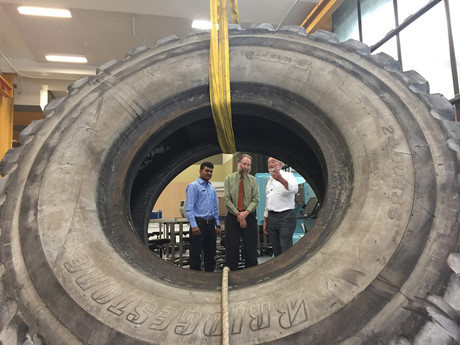QUT testing of oil recycled from tyres finds a cleaner diesel blend

QUT mechanical engineers have tested the oil extracted from old tyres in a process developed by Australian company Green Distillation Technologies (GDT). Professor Richard Brown and PhD student Farhad Hossain tested the oil’s emissions and output at QUT’s Biofuel Engine Research Facility.
Professor Brown said that when the oil was blended with diesel it was found to produce a fuel with reduced emissions and no loss of engine performance.
“Globally, 1.5 billion tonnes of tyres are discarded each year. Australia, alone, will generate 55 million disused tyres a year by 2020,” Professor Brown said. “Getting rid of old tyres in an environment-friendly way is a universal nightmare.
“Stockpiles of used tyres around the world are a health hazard, as demonstrated by the recent Broadmeadows fire in Victoria, which was difficult to put out and generated huge amounts of toxic smoke.”
Hossain said the QUT engineering team, including process engineer Dr Tom Rainey and air quality expert Professor Zoran Ristovski, performed rigorous tests on the oil.
“We tested the oil which GDT produces from both recycled natural and synthetic rubber tyres in 10% and 20% diesel blends,” said Hossain. “We tested the tyre oil blends in a turbocharged, common rail, direct injection, six-cylinder engine in the Biofuel Engine Research Facility at QUT. The engine is typical of engine types used in the transport industry.
“Our experiments were performed with a constant speed and four different engine loads of 25, 50, 75 and 100% of full load. We found a 30% reduction in nitrogen oxide, which contributes to photochemical smog, and lower particle mass, which means fewer problems for emission treatment systems.”
GDT COO Trevor Bayley said the oil could also be used as a heating fuel or further refined into automotive or aviation jet fuel.
“The process recycles end-of-life tyres into oil, carbon and steel, leaving nothing wasted, and even uses some of the recovered oil as the heat source,” said Bayley. “Carbon is the most common recovered ingredient and the steel rim and framework is the third most common ingredient, while the oil is the most valuable.
“We are delighted at the findings of the QUT research as it will help us promote the sustainable use for end-of-life tyres. The potential of this source of biofuel feedstock is immense, and it is more sustainable than other bio-oils from plants such as corn, or algae.
“A recycled 10 kg car tyre yields 4 litres of oil, 1.5 kg of steel and 4 kg of carbon, and a 70 kg truck tyre provides 28 litres of oil, 11 kg of steel and 28 kg of carbon. GDT plans to have the first fully operational commercial plant delivering eight million litres of oil a year from mid-2017, followed by a world-first mining tyre processing plant in either Qld or WA.”
Mars Wrigley to boost Asquith factory with new production line
Mars Wrigley Australia is installing a new production line at its Asquith factory to boost...
Welding body calls for a nation-building approach to combat Trump's tariffs
Weld Australia believes that US tariffs offer Australia a unique opportunity to carve out a new...
New free TAFE courses aim to develop manufacturing skills
The NSW Government has announced four new free TAFE courses designed to upskill Australians and...








